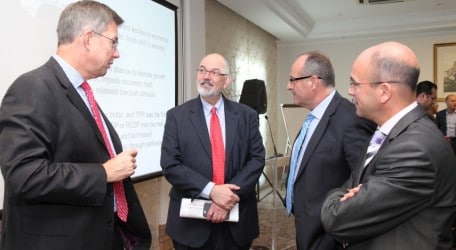
HSBC economist outlines the reshaping of international trade corridors
Pictured above: HSBC Malta CEO Mark Watkinson with Douglas Lippoldt, Michel Cordina and HSBC Head of Corporate Banking Kevin Rapinett
Global trade corridors and their long-term implications and opportunities were tackled by Douglas Lippoldt, a senior trade economist at HSBC, at an exclusive HSBC Commercial Banking Business Meeting.
Lippoldt spoke to the audience about the findings from his latest research ‘Trade Chart Book – The Power of Corridors’, published on 15 September 2015.
“From a quick review of our findings, the extent to which trade is dominated by the big three (US, EU and China) is striking. But, the increasing share of trade for emerging markets is notable. In some instances, one can readily discern China’s inter-linkages with its neighbours via global value chain production,” said Lippoldt.
Between 2004 and 2014, emerging economies increased their relative share of global exports and imports, according to the report. This shift has been fuelled not only by expanding trade between developed and emerging economies, but also by increasing trade between emerging economies – sometimes called “south-south” trade.
“The examination of trade corridors shows that some countries, notably among the emerging markets, are not yet reaching their trade potential. South-south trade is growing but remains ripe for further development, provided that further trade liberalisation can be achieved,” explained Lippoldt.
Economists are pinning their hope for further trade liberalisation on a number of potential new trade agreements currently under discussion. Among the largest are three proposed mega-regional accords: the Trans-Pacific Partnership (TPP) between 12 countries in Asia and the Americas, the Transatlantic Trade and Investment Partnership (TTIP) between the European Union and the US, and the Regional Comprehensive Economic Partnership (RCEP) between 16 Asian countries, including China and India.
“These agreements, if concluded and implemented successfully, could remove barriers to trade, reduce the cost of doing business across borders and provide a new stimulus to the world economy. We think that the time is right for policy makers to seek ambitious liberalisation,” asserted Lippoldt.
HSBC Commercial Banking customers received the full publication, which analyses global trade from a long-term and sectorial perspective, as well as a range of business-centric documents as part of bringing thought leadership content to clients. More information on the report via http://www.hsbc.com/news-and-insight/2015/trade-corridors
Prior to joining HSBC in 2014, Lippoldt was at the Organisation for Economic Co-operation and Development (OECD) in Paris where he had worked for 22 years in various roles. The senior economist was a key speaker at the EY Malta attractiveness survey conference that preceded the HSBC Business Meeting.
HSBC Malta’s Head of Commercial Banking Michel Cordina said: “Mr Lippoldt brought to Malta in-depth insight of the world’s economic state of affairs. HSBC’s global network allows it to capture emerging opportunities from around the world and to bring unrivalled insight to its customers so as to allow more informed decisions.”
- October 24, 2015 No comments Posted in: Business Tags: Douglas Lippoldt, Globe trade corridors, HSBC





